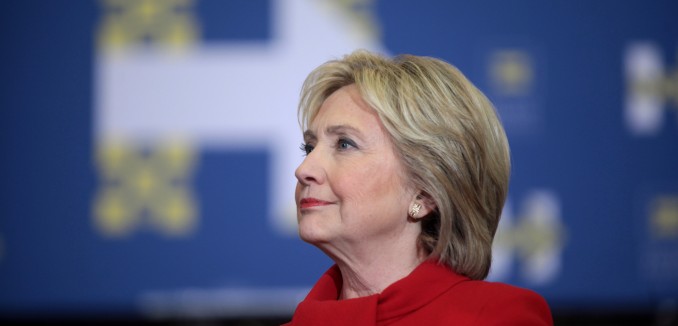The Hillary Clinton presidential campaign publicly condemned a son of one her close advisers after he denounced the Nobel Peace Prize-winning Holocaust survivor Elie Wiesel after Wiesel’s death.
Max Blumenthal, an anti-Zionist activist and son of longtime Clinton confidant Sidney Blumenthal, tweeted less than an hour after Wiesel’s passing: “Elie Wiesel went from a victim of war crimes to a supporter of those who commit them. He did more harm than good and should not be honored.” Blumenthal also promoted an article alleging that Wiesel had denied the Armenian genocide and opposed memorializing gay and Roma victims of the Holocaust.
Elie Wiesel is dead. He spent his last years inciting hatred, defending apartheid & palling around with fascists. pic.twitter.com/3bRTq4QDye
— Max Blumenthal (@MaxBlumenthal) July 2, 2016
Elie Wiesel went from a victim of war crimes to a supporter of those who commit them. He did more harm than good and should not be honored.
— Max Blumenthal (@MaxBlumenthal) July 2, 2016
“Secretary Clinton emphatically rejects these offensive, hateful, and patently absurd statements about Elie Wiesel,” Jake Sullivan, senior policy aide to the Clinton campaign, said in a statement to The Jerusalem Post.
She believes they are wrong in all senses of the term. She believes that Max Blumenthal and others should cease and desist in making them. Elie Wiesel was a hero to her as he was to so many, and she will keep doing everything she can to honor his memory and to carry his message forward.
In contrast to Blumenthal’s claims, Weisel was a vocal advocate on behalf of victims of the Armenian genocide, the denial of which Wiesel repeatedly called a “double killing.”
In 2007, the Elie Wiesel Foundation for Humanity published a letter condemning Armenian genocide denial, which was signed by Wiesel and 52 other Nobel laureates:
Turks and Armenians have a huge gap in perceptions over the Armenian Genocide. To address this gap, we refer to the 2003 “Legal Analysis on the Applicability of the United Nations Convention on the Prevention and Punishment of the Crime of Genocide to Events which Occurred During the Early Twentieth Century,” which corroborated findings of the International Association of Genocide Scholars.
It concluded that, “At least some of the [Ottoman] perpetrators knew that the consequences of their actions would be the destruction, in whole or in part, of the Armenians of eastern Anatolia, as such, or acted purposefully towards this goal and, therefore, possessed the requisite genocidal intent. The Events can thus be said to include all the elements of the crime of genocide as defined in the Convention.” It also concluded that, “The Genocide Convention contains no provision mandating its retroactive application.”
“I have been fighting for the right of the Armenian people to remember for years and years,” Wiesel said in a 2008 interview that touched on a debate in Congress about U.S. recognition of the genocide, which Turkey stridently opposed. “How could I, who has fought all my life for Jewish remembrance, tell the Armenians they have no right to remember? But I understand the administration’s view. Fortunately, as a private citizen I don’t have to worry about Turkey’s response. But I do feel that had there been the word ‘genocide’ in those days, what happened to the Armenians would have been called genocide. Everyone agrees there was mass murder, but the word came later. I believe the Armenians are the victims and, as a Jew, I should be on their side.”
Wiesel also did not oppose the commemoration of Roma or LGBT victims of the Holocaust.
In 1979, after he was appointed to chair the U.S. Holocaust Memorial Council, Wiesel wrote in his report to the president:
The Universal and the Particular: The Jews were Hitler’s primary victims against whom the total fury of the Holocaust was unleashed: to dilute or deny this reality would be to falsify it in the name of misguided universalism. Since Jews were not the only people to suffer and since others perished for their convictions or affiliations, for their nationality or race in the machinery of death initially designed for the destruction of Jews, the Commission recommends that the museum incorporate displays on the Poles, the Gypsies, and other exterminated groups.
He further emphasized towards the end of his report:
In addition to the Jewish people who were engulfed by the Holocaust simply because they were Jews, 5 million other human beings were destroyed. About 3 million Poles, many Hungarians, Gypsies, also need to be remembered. To memorialize the victims of the Holocaust, we must harness the outrage of our own memories to stamp out oppression wherever it exists. We must understand that human rights and human dignity are indivisible. Wherever our fellow human beings are stripped of their humanity, defiled or tortured or victimized by repres sion or terrorism or racism or prejudice, then all of us are victims. As Americans, we must, and we also will speak out in defense of human rights at home and everywhere in the world.
Blumenthal was one of many anti-Zionist activists who used Wiesel’s death as an opportunity for political messaging on social media. Ali Abunimah, the founder of the website Electronic Intifada, called Wiesel “vile” and tweeted, “Elie Wiesel will be remembered by Palestinians for his racism and his propaganda services to their oppressors, ethnic cleansers and killers.”
Bonds between the Clinton and Blumenthal families have been scrutinized during the FBI’s investigation into her email practices. Emails released as part of the investigation showed close communication between Hilary Clinton and Sidney Blumenthal, who would often include links to articles written by his son. Clinton responded positively on several occasions, including comments like, “A very smart piece as usual,” “Max strikes again!” and “Your Max is a mitzvah!”
[Photo: Gage Skidmore / Wikimedia]




